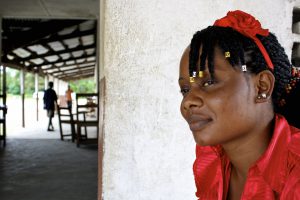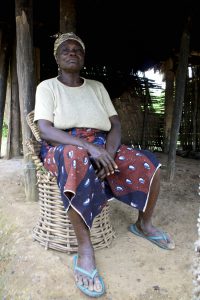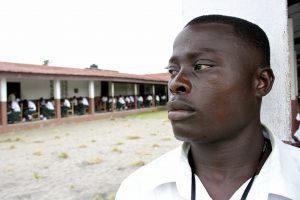Cestos City – Hannah Toe is in the twelfth grade class at Cestos High School in rural Rivercess County. She looks youthful with cornrows and a red flower headband in her hair matching her ruffled top, but she is 24 years old and already a mother, with a five-year-old son named Tony.
Part 3 of a 3-part series on Liberia’s Rural Education Crisis, a collaboration between New Narratives and Front Page Africa newspaper and website.

Toe was 17 when she got pregnant. She dropped out of school to take care of the baby while the child’s father, a high school graduate, went to work in the gold mines to support his son.
Toe holds parents responsible for the rampant rate of teenage pregnancy and early parenthood, especially in rural areas.
“I blame my parents because they didn’t guide and advise me,” said Toe. “Our parents don’t tell us about sex and the dangers ahead when we start to receive our period. They say it is rude to discuss that kind of topic with their children. For this reason, you find many girls roaming the streets and not under control.”
Toe’s story is one of thousands in Liberia. Teen pregnancy, together with its subsequent poverty, is a national crisis. It is an age-old problem that hinders the educational mindset of many girls here and holds them back.
“Some girls get married before they enter school or are in elementary,” said Peter Cole, acting principal of Cestos High School. “Can you imagine a girl who is in the third grade and already married? So how can she concentrate on her lesson?”
“She would feel too big, too mature to abide by the school’s policies and guidelines because she has a home that she manages. This gives the administration a headache because these girls don’t want to be controlled.”
Also beyond education officials’ control are Liberia’s traditional societies and their schools. In rural villages throughout the country, girls are carried to the Grebo or Sande Bush, even while regular school is in session. Originally created to train young girls to look after a household and a husband, the bush schools contribute to the alarming early pregnancy trend. When a girl passes the initiation ritual, marked by female genital cutting, and graduates from the bush school, she is considered ready for marriage and childbearing, no matter her age. Most girls never return to their regular studies.
“If these children come from the Sande Bush, it is difficult to get them back into the classrooms,” said Dallas Gueh, Junior Senator, Rivercess County. “This means they are not helping the system because the traditional society only prepares them to be a housewives; it does not prepare them to become leaders.”
“The Sande society does not only pose a problem but a serious threat to this country. If there is no check to this situation, we are going to have many uneducated people in our society.”
Rural areas like Rivercess – and other counties where the Sande and Poro societies are active – are governed by chiefs and spiritual leaders who protect the culture and traditions of the land. They are equally revered and feared by village residents. Any citizen violating a traditional law is dealt with and punished as these leaders see fit.
“I teach girls how to respect their husband and not control their men in the home, and they listen to me,” said Mamie Toe, known as Zoe Mamie, a spiritual leader or chief “zoe” who runs the Sande Bush in Rivercess County. “Because in this time, girls just want to jump from man to man and don’t want to be under control.”
Zoe Mamie is well-known here and feared by many. She considers the Sande Bush her very own school. Parents pay her LD $3,000 (US $39) and half a bag of rice when their daughters are ready to graduate.

Girls today are rude, and parents can’t control them, said Zoe Mamie in her thick local dialect, so they must go to the Sande to be trained otherwise.
If a girl not in Sande speaks ill about the society, she will be dragged into the bush and circumcised as punishment, said Zoe Mamie.
“I have my bush and if any girl is sassy, I will carry her into the bush and put her under control,” said Zoe Mamie. “I can do it because at this time, children don’t respect we the old people, so we will control them.
“We the zoes got our eye outside to see if you, who ain’t join the society bush, put your mouth in something you don’t know. We will put crime on you and carry you in the bush and discipline you because it is not your business to talk about our school business.
Bush schools in many rural parts of Liberia have come under fire from teachers and school administrators for interfering with the formal education curriculum set by the Ministry of Education.
“The Sande Bush has an impact on a girl child’s education because two things cannot occupy one space,” said Principal Cole of Cestos High School. “When girls are in the Sande, they are out of school. While they are in the Sande, they won’t learn anything but to get married and cater to their homes – which they put into practice as soon as they leave the Sande Bush.”
The effects of early parenthood are not limited to our nation’s girls, but the boys as well. Many young fathers here leave school for days at a time in order to scrape together a few dollars.
“They too leave school to go work in the gold mines,” said Cole. “Some of them leave during weekends or vacation to go to these various mines and don’t return to school on time, or some don’t come back at all but rather focus on making more money for their families.”
Gabriel Danwleh, 25, who is in the eleventh grade at Cestos High, got a girl pregnant two years ago. The mother of his son, “Small Gabriel”, is 20 years old now and in the sixth grade at a local elementary school.
Danwleh skips school to go to the mines to hustle for money to support his family and afford school fees. He usually leaves on Thursday and does not return to school until Tuesday morning.
“When I work one whole day, I make LD $500, so when I work for three days, I get LD $1,500,” said Danwleh. “I don’t enjoy leaving school to go and work, but my parents died during the war and I have nobody to help me.”

“With the money I get from the mines, I buy pamphlets and pay other fees on campus. I also buy my baby’s food and pay my girl’s school fees as well.”
Government and international partner organizations are putting into place a system to tackle the teen pregnancy crisis. Efforts include the launch of massive awareness campaigns focusing on family planning and birth control.
Rivercess has a basic road network that allows contraceptives to reach its clinics. In this respect, it is better off than other rural parts of Liberia. Students here have access to birth control if they want it.
Sixth-grade student Hannah Gaysayee, 19, of Upper Timbo Community School gets oral contraceptives from the general hospital in the capital seat of Cestos City. Most of her friends, however, do not take advantage of these protections, she said.
“I am taking birth control not to get pregnant, but when I advise my friends about family planning, they tell me that they want to have their babies while they are young,” said Gaysayee.
Seven girls started the sixth grade alongside Gaysayee. Over the course of the school year, that number plummeted to two. Five girls dropped out because they got pregnant. Now they are married and running a home, said Gaysayee.
Cestos High School acting principal Cole said education officials are encouraging girls to stay in school because the country depends on them.
“We have a gender ministry branch that comes on campus twice a year to teach the girls family-life education and help them to be dependable,” said Cole. “It is not sufficient, but we have to start from somewhere.”
While many girls are breadwinners of their homes at a young age, sex education is still not taught in many schools across Liberia. While Hannah Gaysayee considers herself lucky to be on birth control, girls in rural areas inaccessible by roads are left with no access to family planning. Our girls wait for the Ministry of Health to send in a mobile team. Our girls wait for Public Works to fix the roads. Our girls wait for education to be a national priority. Our girls wait. But their bodies do not.
Mae Azango is a fellow of New Narratives, a project supporting the businesses of leading independent media in Africa. See more at www.newnarratives.org. New Narratives and FrontPage Africa traveled to Rivercess in 2012.
